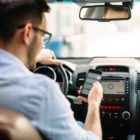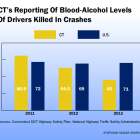I-Team In-Depth
Court Awards, Settlements Rising In Distracted Driving Lawsuits
|
A New Britain couple, seriously hurt in a cellphone-related car accident on Route 8 in Harwinton, received a $1.3 million settlement in November. The previous year, a jury awarded a Torrington woman $1.4 million after a driver, talking on his cellphone while turning, struck her head-on, breaking her wrist and causing permanent injuries to her neck and back. These are two of the largest awards or settlements to go to motorists injured in crashes since Connecticut’s ban on talking and texting on cellphones went into effect in 2005, and a recent change to court procedure may pave the way for more large settlements. Despite the large awards, the incidence of fatalities and injuries from motor vehicle accidents in the state has continued to rise in recent years, state data indicates. The total number of car crashes increased every year from 2011 to 2016– from 78,433 in 2011, to 116,117 last year — according to UCONN’s Connecticut Crash Data Repository, which contains data that the state Department of Transportation collects.

